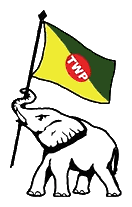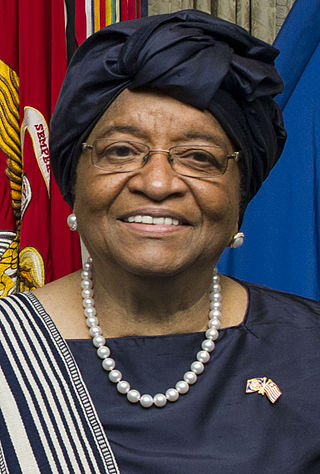| |||||||||||
Presidential election | |||||||||||
| |||||||||||
| |||||||||||
 |
|---|
General elections were held in Liberia in May 1879. Incumbent president Anthony W. Gardiner of the True Whig Party was the only candidate in the presidential elections, [1] and was elected unopposed. [2]
| |||||||||||
Presidential election | |||||||||||
| |||||||||||
| |||||||||||
 |
|---|
General elections were held in Liberia in May 1879. Incumbent president Anthony W. Gardiner of the True Whig Party was the only candidate in the presidential elections, [1] and was elected unopposed. [2]

Liberia, officially the Republic of Liberia, is a country on the West African coast. It is bordered by Sierra Leone to its northwest, Guinea to its north, Ivory Coast to its east, and the Atlantic Ocean to its south and southwest. It has a population of around 5.5 million and covers an area of 43,000 square miles (111,369 km2). The official language is English. Over 20 indigenous languages are spoken, reflecting the country's ethnic and cultural diversity. The capital and largest city is Monrovia.

Liberia is a country in West Africa founded by free people of color from the United States. The emigration of African Americans, both freeborn and recently emancipated, was funded and organized by the American Colonization Society (ACS). The mortality rate of these settlers was the highest among settlements reported with modern recordkeeping. Of the 4,571 emigrants who arrived in Liberia between 1820 and 1843, only 1,819 survived (39.8%).

The Politics of Liberia takes place in a framework of a presidential representative democratic republic modeled on the government of the United States, whereby the president is the head of state and head of government; unlike the United States, however, Liberia is a unitary state as opposed to a federation and has a pluriform multi-party system rather than the two-party system that characterizes US politics. Executive power is exercised by the government. Legislative power is vested in both the government and the two chambers of the legislature.

Samuel Kanyon Doe was a Liberian politician and military officer who served as the 21st President of Liberia from 1986 to 1990. He ruled Liberia as Chairman of the People's Redemption Council (PRC) from 1980 to 1986 and then as president from 1986 to 1990.

The president of the Republic of Liberia is the head of state and government of Liberia. The president serves as the leader of the executive branch and as commander-in-chief of the Armed Forces of Liberia.

The True Whig Party (TWP), also known as the Liberian Whig Party (LWP), is the oldest political party in Liberia and Africa as a whole. Founded in 1869 by primarily darker-skinned Americo-Liberians in rural areas, its historic rival was the Republican Party. Following the decline of the latter, it dominated Liberian politics from 1878 until 1980. The nation was virtually governed as a one-party state under the TWP, although opposition parties were never outlawed.

George Tawlon Manneh Oppong Ousman Weah is a Liberian politician and former professional footballer who served as the 25th president of Liberia from 2018 to 2024. Before his election for the presidency, Weah served as senator from Montserrado County. He played as a striker in his prolific 18-year professional football career which ended in 2003. Weah is the first African former professional footballer to become a head of state, and the only African Ballon d'Or and FIFA World Player of the Year winner in history, winning both awards in 1995. He won the African Footballer of the Year 3 times and is considered one of the greatest strikers ever.

Elections in Liberia occur solely at the national level. The head of state, the President of Liberia, is elected to a six-year term in a two-round system, in which a run-off between the two candidates with the highest number of votes is held should no single candidate earn a majority of the vote in the first round. The Legislature has two elected chambers.

General elections were held in Liberia on 11 October 2005, with a runoff election for the presidency held on 8 November. The presidency and all seats in the House of Representatives and Senate were up for election. The elections were the first held since 1997 and marked the end of the political transition following the second civil war, having been stipulated in the Accra Comprehensive Peace Agreement of 2003. Ellen Johnson Sirleaf, former World Bank employee and Liberian finance minister, won the presidential contest and became the first democratically elected female African head of state in January 2006.

The First Liberian Civil War was the first of two civil wars within the West African nation of Liberia which lasted between 1989 and 1997. President Samuel Doe's regime of totalitarianism and widespread corruption led to calls for withdrawal of the support of the United States, by the late 1980s. The National Patriotic Front of Liberia (NPFL) led by Charles Taylor invaded Liberia from the Ivory Coast to overthrow Doe in December 1989 and gained control over most of the country within a year. Doe was captured and executed by the Independent National Patriotic Front of Liberia (INPFL), a splinter faction of the NPFL led by Prince Johnson, in September 1990. The NPFL and INPFL fought each other for control of the capital city, Monrovia and against the Armed Forces of Liberia and pro-Doe United Liberation Movement of Liberia for Democracy. Peace negotiations and foreign involvement led to a ceasefire in 1995 but fighting continued until a peace agreement between the main factions occurred in August 1996. Taylor was elected President of Liberia following the 1997 Liberian general election and entered office in August of the same year.

The Unity Party (UP) is a political party in Liberia that was started in 1984 by Edward B. Kesselly, also its first standard bearer. Officially founded in Buchanan, Grand Bassa County, the party was established on 27 July 1985. The Unity Party participated in the first elections after the 1980 coup, running against President Samuel Doe in October 1985. The party has remained active in Liberian politics since and is the current ruling party following the 2023 Liberian general election.

General elections were held in Liberia on 19 July 1997 as part of the 1996 peace agreement ending the First Liberian Civil War. The presidency, as well as all seats in the House of Representatives and the Senate were up for election. Voter turnout was around 89%. Former rebel leader Charles Taylor and his National Patriotic Party (NPP) won the election with 75.3% of the vote, giving it about three-quarters of the legislative seats according to the proportional representation system. Taylor was inaugurated as president on 2 August 1997.

Ellen Johnson Sirleaf is a Liberian politician who served as the 24th president of Liberia from 2006 to 2018. Sirleaf was the first elected female head of state in Africa.

The Legislature of Liberia is the bicameral legislature of the government of Liberia. It consists of a Senate – the upper house, and a House of Representatives – the lower house, modeled after the United States Congress. Sessions are held at the Capitol Building in Monrovia. Legislature of Liberia is considered one of the three branches of government based on the Article III of the Constitution of Liberia that stipulates all three branches ought to be equal and coordinated based on the Principle of checks and balances.

The House of Representatives is the lower chamber of the bicameral legislative branch of Liberia, and together with the Senate comprises the Legislature of Liberia. The number of seats is fixed by law at 73, with each county being apportioned a number of seats based on its percentage of the national population. House members represent single-member districts within the counties drawn up by the National Elections Commission and serve six-year terms. The House meets at the Capitol Building in Monrovia.

The Senate is the upper house of the bicameral legislative branch of Liberia, and together with the House of Representatives comprises the Legislature of Liberia. Each of the fifteen counties are equally represented by two senators, elected to serve staggered nine-year terms. The Senate meets at the Capitol Building in Monrovia.

The Constitution of Liberia is the supreme law of the Republic of Liberia. The current constitution, which came into force on 6 January 1986, replaced the Liberian Constitution of 1847, which had been in force since the independence of Liberia. Much like the 1847 Constitution, the Constitution creates a system of government heavily modeled on the Federal Government of the United States.

General elections were held in Liberia on 11 October 2011, with a second round of the presidential election on 8 November. The presidency, as well as all seats in the House of Representatives and half of the seats in the Senate, were up for election. The election was overseen by the National Elections Commission (NEC).

General elections were held in Liberia on 10 October 2017 to elect the President and House of Representatives. No candidate won a majority in the first round of the presidential vote, so the top two finishers – CDC standard-bearer Amb. George Weah and UP standard-bearer Vice President Joseph Boakai – competed in a run-off on 26 December. The second round was originally scheduled for 7 November, but was postponed after LP standard-bearer Cllr. Charles Brumskine, in third place, challenged the result in the Supreme Court. The Supreme Court dismissed the challenge, which would have forced a re-run of the first round had it been successful, and the second round was held on 26 December. Weah emerged victorious with 60% of the vote.

General elections were held in Liberia on 10 October 2023 to elect the President, House of Representatives and half of the Senate. Incumbent president George Weah was eligible for a second term. No candidate won a majority in the first round, with Weah narrowly placing first over opposition leader Joseph Boakai, which meant both advanced to a runoff held on 14 November 2023. Boakai defeated Weah by just over one percentage point in the closest runoff in Liberia's history, and Weah conceded the election peacefully.